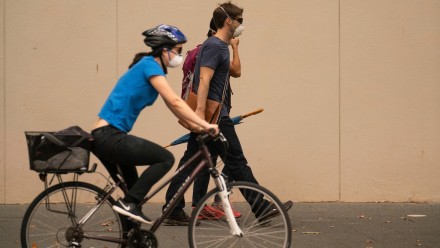What is the role of Universities in a crisis?
Share
2020 has the unfortunate distinction of providing ample opportunity to address the role of universities during a crisis. This year, bushfires incinerated an area equivalent to England, destroyed thousands of buildings, killed or displaced an estimated three billion animals, and 33 people tragically lost their lives fighting them.
Then there was the smoke — engulfing whole cities, with Canberra recording the world’s worst air quality for several days in a row.
Researchers from across the Australian National University (ANU) understood they had a major role to play in protecting the physical and mental health of our communities. Professor Russell Gruen, Dean of the College of Health and Medicine, quickly established the Bushfire Impact Working Group, bringing together academics from public health, psychology, clinical medicine, as well as climate scientists, disaster risk scientists and science communications experts.
"We recognised an immediate need for evidence-based health communications on bushfire smoke that was accessible to communities," says Professor Lucas, founding Chair of the group.
While academics are sometimes mocked as working in ivory towers, the actions of the group went well beyond the walls of their institution. The team rolled up their sleeves and worked alongside the community. Experts in air pollution and science communication mobilised to fill the gap in reliable information for affected and worried people. This information was translated into multiple languages and disseminated widely to culturally diverse communities.

Dr Arnagretta Hunter and Professor Robyn Lucas from the ANU Bushfire Impact Working Group being presented the 2020 Sidney Sax Medal by AHHA Chair, the Hon Jillian Skinner.
The team continued to engage with affected communities, allowing their health concerns to guide research questions.
"We know a lot about air pollution, but there is a big knowledge gap surrounding bushfire smoke," says current Bushfire Impact Working Group Chair, Dr Arnagretta Hunter.
"Nine out of ten people suffered some kind of physical health issue from the bushfire smoke, and 50% of the population were anxious. Communities were asking me questions like 'what are the longterm health effects from breathing in bushfire smoke? What are the implications for my unborn baby?' And I couldn’t give them a good answer."
So the team set out to investigate various health impacts on short and long timescales. They rapidly set up air quality monitoring stations, tested lung function among at-risk people, forged programs to assess smoke implications on pregnancy, and assessed the impact of bushfires on local communities and their health services.
Their work continues and has broadened to include advocating for the community in the policy sphere. To this end they participated in the Emergency Leaders for Climate Action Roundtables; made submissions to the Senate Finance and Public Administration Inquiry into the bushfires and to the Royal Commission into Natural Disasters, and have called for a National Strategy for Health and Climate Change.
"The group is very much driven by a need to be helpful and to use the skills and knowledge that we have to help our communities get through a tough period," says Dr Hunter.
"Our advocacy work with the bushfire community is really important. We want to make sure that they are not forgotten in amongst the coronavirus pandemic."
Indeed, while universities are traditionally thought of as places of knowledge creation and education, recent disasters have shown the importance of their role as leaders and supporters of our communities.
"The role of universities doesn’t stop with doing great research. We need to be advocates to ensure we’re progressing as a society and as a community, so that future generations have an opportunity to live healthy, productive lives," says Professor Gruen.
"These are not traditional ways of working for academics or universities, either in nature or timeframes. But they could and should be."
The Australian National University Bushfire Impact Working Group, led by Professor Robyn Lucas and Dr Arnagretta Hunter and Patricia Turner, Chief Executive of the National Aboriginal Community Controlled Health Organisation, were jointly awarded AHHA’s 2020 Sidney Sax Medal for outstanding health leadership.
This article by Liz Drummond is republished from The Health Advocate under a Creative Commons license. Read the original article.











